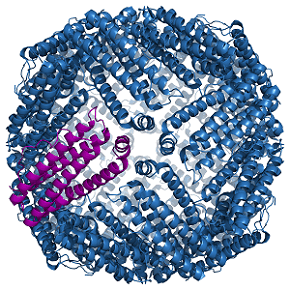You’re probably aware that a chronic iron deficiency leads to anemia. You know you need to eat your spinach. But do you know that a ferritin deficiency can lead to sleep disorders and other health problems such as depression, fatigue, and dry skin?
Ferritin? That sounds high tech. Let’s start at the beginning.
Your body uses hemoglobin to carry oxygen to all the cells in the body, and it needs sufficient iron to do that. To get iron, you eat foods containing iron. The body then stores the iron in a protein called ferritin until it is needed.
 The ferritin protein contains about 20 percent iron. Ferritin resides in cells, with the highest concentrations in the liver and immune system.
The ferritin protein contains about 20 percent iron. Ferritin resides in cells, with the highest concentrations in the liver and immune system.
When the body makes new red blood cells, it’s ready to use the iron and signals a ferritin release. To get really technical, the ferritin binds with a protein called transferrin, and transferrin carries the ferritin to the red blood cells where it’s needed. The bottom line is that if you don’t have enough ferritin, the iron in your body will be depleted quickly. That’s when you might experience the sleep disorders, depression, fatigue, and dry skin mentioned at the beginning of this article. Other possible symptoms of low-ferritin are leg pains, shortness of breath, irritability, dizziness, headaches, and ringing in your ears.
In one case study, a person suffering from depression was given iron and the depression went away. In another a person with insomnia was given iron and the insomnia went away. At the start of the studies the people were tested and they both had a ferritin deficiency. Interestingly, both people had normal hemoglobin levels. For this reason a ferritin deficiency is sometimes referred to as a “hidden” iron deficiency.
How Do You Determine a Ferritin Deficiency?
Your doctor can find out if you have a ferritin deficiency by doing a blood test.
 While you’re waiting for that, you can get a good indication by checking your lower eyelid. Pull your lower lid down and look at the back of the lid. If it looks whitish, you might have a ferritin deficiency. Of course you’ll want to work in conjunction with your doctor to diagnosis and solve your problem. As an example, if your levels are low the doctor might recommend a supplement, but if they are very low an iron infusion may be needed. Meanwhile, you can simply eat more iron-rich foods. These include shellfish and fish, red meat, including beef and beef liver, and chicken.
While you’re waiting for that, you can get a good indication by checking your lower eyelid. Pull your lower lid down and look at the back of the lid. If it looks whitish, you might have a ferritin deficiency. Of course you’ll want to work in conjunction with your doctor to diagnosis and solve your problem. As an example, if your levels are low the doctor might recommend a supplement, but if they are very low an iron infusion may be needed. Meanwhile, you can simply eat more iron-rich foods. These include shellfish and fish, red meat, including beef and beef liver, and chicken.
Spinach and seaweed are also good sources of iron, but they also have oxalic acid, which makes the iron less absorbable. You can work around this by eating vitamin C at the same time, for example by using raw lemon juice, because vitamin C converts the iron into a form that it easier to absorb. Be aware that cooking foods with vitamin C reduces the amount of vitamin C, so try adding more raw veggies to your diet.
Do you want to find an effective Insomnia treatment? Check out our top rated Insomnia products











